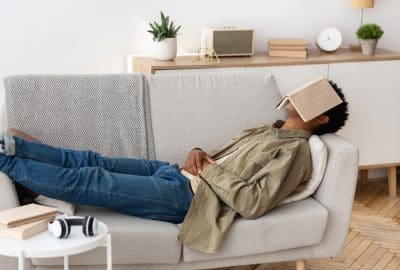We’ve all been there. You’re cozy in bed, about to drift off to sleep, when thirst strikes. The question presents itself. should you ignore it and try to sleep, or should you get up for that refreshing glass of water? The debate around nighttime water consumption has created confusion, with some claiming it’s essential for health while others warn it disrupts crucial sleep cycles. The reality, as with most health topics, contains more nuance than the headlines suggest, with both potential benefits and drawbacks worth considering.
The midnight thirst mystery
That sudden urge for water as you’re settling into bed isn’t random. Several factors might be triggering your nighttime thirst.
Your body’s natural hydration rhythm fluctuates throughout the day. Hormone levels that regulate fluid balance shift during the 24-hour cycle, sometimes increasing thirst sensations as bedtime approaches. This biological pattern served our ancestors well, encouraging them to hydrate before long periods without access to water.
Evening habits often unknowingly trigger thirst. Salty dinner foods, alcoholic beverages, or even certain medications can increase your body’s water needs. That bedtime thirst might actually be your body’s reasonable response to earlier consumption choices.
Bedroom environments affect hydration status significantly. Heated rooms during winter months or air conditioning in summer can create surprisingly dry air that pulls moisture from your body through respiration and skin. This environmental moisture loss often manifests as nighttime thirst.
Daytime underhydration catches up with many people at night. If you’ve been busy and neglected adequate water intake during the day, your body might signal its needs more strongly once you’ve finally slowed down and are trying to sleep.
Certain medical conditions and medications increase nighttime thirst. Diabetes, autoimmune disorders, and many common pharmaceuticals create increased fluid needs that might become more noticeable during the quiet evening hours.
The case for nighttime sipping
Despite concerns about sleep disruption, drinking water before bed offers several potential health benefits worth considering.
Overnight dehydration affects many bodily functions. During sleep, you naturally lose water through breathing and sweating, sometimes up to a pound of water weight by morning. Without adequate hydration, this loss can contribute to morning grogginess, headaches, and dry mouth upon waking.
Your brain relies heavily on proper hydration. Studies show even mild dehydration can affect mood, cognition, and energy levels the following day. A small amount of water before bed might help maintain optimal brain function throughout your sleep cycle.
Heart health benefits from consistent hydration. Your blood becomes more viscous when you’re dehydrated, forcing your cardiovascular system to work harder. Adequate fluid levels, maintained even at night, support healthier blood pressure and cardiac function during sleep.
Detoxification processes continue while you sleep. Your body performs significant waste-clearing functions overnight, particularly through kidney filtration. Sufficient water helps these systems operate efficiently, potentially supporting your body’s natural cleansing mechanisms.
Muscle recovery happens primarily during sleep phases. If you’re physically active, adequate hydration supports the repair processes that strengthen muscles after workouts. This recovery requires sufficient water to transport nutrients and remove metabolic waste products.
The potential downsides to consider
Despite the benefits, there are legitimate reasons some people might want to reconsider their bedtime water habits.
Sleep disruption from bathroom trips represents the most obvious drawback. Waking up to urinate interrupts your sleep cycle, potentially preventing you from reaching or maintaining deeper, more restorative sleep stages. This fragmentation can affect next-day functioning and long-term health when it becomes a pattern.
Nocturia, the medical term for excessive nighttime urination, affects many older adults and those with certain health conditions. For people already experiencing this issue, additional evening fluids might worsen an existing problem and further disrupt sleep quality.
Certain medical conditions complicate nighttime fluid intake. People with congestive heart failure, some kidney disorders, or lower extremity swelling might receive medical advice to limit evening liquids as part of their treatment plan. Always follow professional medical guidance for your specific situation.
Timing matters significantly in determining effects. Water consumed immediately before bed affects sleep differently than hydration an hour or two earlier. Finding your personal optimal window requires attention to how your body responds to different timings.
Individual differences play a major role in hydration needs. Factors like body size, activity level, climate, overall diet, and personal physiology all influence how much water benefits you versus when it might become disruptive. There’s no universal rule that works for everyone.
Finding your personal hydration balance
Rather than following generic advice, discovering your optimal nighttime hydration approach requires some personal experimentation and observation.
The color of your morning urine provides a simple hydration check. Pale yellow indicates good hydration, while darker yellow suggests you might need more fluids. Completely clear urine could indicate overhydration. This visual feedback helps you adjust your approach over time.
Tracking sleep quality alongside water consumption reveals patterns specific to your body. Notice whether nights with more or less evening hydration correlate with better sleep, morning energy levels, or mood. Simple notes in a sleep journal can reveal valuable personal insights.
Distributing water intake throughout the day often works better than playing catch-up at night. Aim to consume most of your daily water needs during waking hours, potentially reducing bedtime thirst without sacrificing overall hydration.
The content of evening beverages matters as much as the volume. Caffeine and alcohol act as diuretics that increase fluid output while potentially disrupting sleep. Herbal teas or plain water represent better evening choices for most people.
Small adjustments often yield better results than dramatic changes. Try modifying your water timing by 30-minute increments or reducing volume slightly rather than eliminating evening hydration entirely. These modest shifts help you discover your personal sweet spot.
Special considerations for specific groups
Different life stages and health conditions create unique hydration needs that affect nighttime water recommendations.
Older adults face particular challenges with nighttime hydration. Age-related changes in kidney function, thirst perception, and bladder capacity create a complicated balance between dehydration risk and sleep disruption from bathroom trips. Focusing fluid intake in the morning and afternoon often works best for seniors.
Athletes and very active individuals have increased overall hydration needs. Intensive exercise increases both fluid requirements and the body’s ability to regulate water balance. For this group, evening hydration might be particularly important for recovery, though timing it a few hours before sleep can minimize disruptions.
Pregnant women experience significant changes in fluid needs and urinary frequency. The growing uterus places pressure on the bladder, often increasing nighttime bathroom trips regardless of water intake. Finding a personal balance becomes particularly important during these nine months.
Children have different hydration patterns than adults. While staying hydrated remains important for kids, limiting fluids in the hour or two before bedtime can help prevent bedwetting issues while still supporting overall health.
People living in dry or high-altitude environments face increased fluid losses. These environmental conditions increase water needs while potentially making nighttime dehydration more likely. Slightly more liberal evening water intake might benefit those in these settings.
Practical strategies for optimal nighttime hydration
Rather than thinking in all-or-nothing terms, these practical approaches can help you balance hydration needs with sound sleep.
Front-loading water intake earlier in the day ensures adequate hydration while minimizing nighttime disruptions. Try consuming about two-thirds of your daily water before mid-afternoon.
The gradual decrease approach reduces fluid volume as bedtime approaches without eliminating it entirely. Full glasses earlier in the evening give way to small sips as sleep time nears.
Pre-emptive bathroom visits about 30 minutes after your last drink and again right before bed can empty your bladder more completely, potentially reducing nighttime interruptions even with reasonable evening hydration.
Electrolyte balance affects how your body retains and uses water. Extremely pure water without any minerals can actually flush through your system more quickly. A tiny pinch of salt in evening water or consuming mineral-rich foods with your water might help your body retain appropriate moisture levels overnight.
Bedroom humidity levels affect how much moisture your body loses during sleep. Using a humidifier in dry environments can reduce the amount of water lost through breathing and skin, potentially decreasing both nighttime thirst and morning dehydration.
The bottom line on bedtime water
The question of whether drinking water at night is “good” or “bad” for health lacks a universal answer because individual needs vary significantly based on numerous factors.
For most healthy adults, moderate water intake even in the evening hours poses no health concerns while potentially offering benefits. The key lies in finding your personal balance point where hydration benefits outweigh any sleep disruption costs.
Consistency often matters more than rigid rules about timing. Your body functions best with reliable patterns, so a consistent approach to hydration throughout the day and evening typically yields better results than dramatic swings between dehydration and overhydration.
Medical conditions always take precedence over general guidelines. If you have specific health concerns, work with healthcare providers to determine the hydration approach that best supports your overall wellbeing, including appropriate timing.
Quality sleep and adequate hydration both play crucial roles in health. Rather than sacrificing one for the other, the thoughtful approach involves finding your personal strategy that reasonably supports both needs. With some attention to your body’s signals and responses, you can discover the nighttime hydration routine that works best for your unique situation.


















